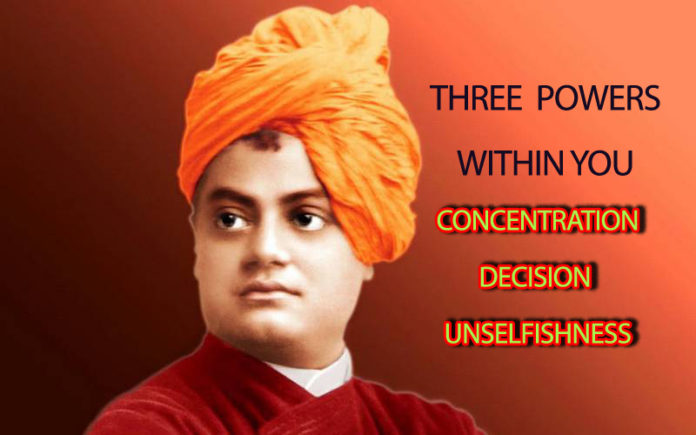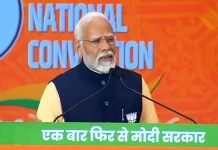Each of us here has been given a purpose in life, a reason for being, and each of us carries within us a caring heart and a mind filled with a multitude of ideas. We are beckoned as people of faith to rise above our heartache and work in the community to make a difference to the world, to laugh and to play and to know within the deepest part of our souls that we are good and contributing to something larger than ourselves.
By Prathima.G.Kulkarni
Swami Sarvapriyananda is a monk attached to the Ramakrishna Math and Mission who joined in 1994 and received sanyas in 2004. He has been appointed as Minister and Spiritual Leader of the Vedanta Society of New York, and assumed his duties on January 6, 2017. The Three powers of Swami Vivekananda were explained by him as follows:
Power of Concentration
Swami Vivekananda said, “The difference between an ordinary person and a great person lies in the degree of concentration”. This may make you think how only concentration can make a common man a great man like Swami Vivekananda? That is the power of concentration, which helps a person to absorb the information completely and keep him or her stay focused.
The Swami recalls. “Once, I met Shreesh Maharaj when he was young reading a book. I asked him what he is reading but there was no reaction from him. I asked him again approaching him closely and yet there was no response. He had his foot extended so I shook his toe and asked him what he was reading and again I get no response. Finally I took the book away from him, which startled him. This was the level of absorption Sireesh Maharaj had when he was reading that book.
The thing that differentiates an extraordinary person from a common person is his ability to focus, which is the power of absorption. This comes when the concentration is at its peak and holds that there longer.
Steps of concentration:
- Bear down on the object
- Cut down distraction or blocking
- Hold on for a long time
Power of making a decision:
What will we think? What will we say? What will we do?
Awaking from the sleep state and moving to self conscious state is the time when we make the right decision. Here the sleeping soul is roused to self-conscious activity.
Power of decision is the most important thing that needs to be followed every minute by every person. Only the day we decide that we need to get up early so that we can work out is the day we are able to achieve our objectives. The first day you will because you have decided. But second day you will may not be able to do so due to your habit and may not be able to exercise the power of decision.
It is a normal human tendency to say that we won’t do it. This is not only the case with common men but also with those who are more enlightened. The solution for this is that you have to know the power of decision-making and try to inculcate that in your day-to-day life.
When you are in a dilemma as to how to decide, make a list of what you do not want to do. This will help you to introspect and understand what exactly your heart desires to do.
Power of unselfishness
Heart is the biggest priority as preached by Swami Vivekananda. Think from your heart, and not by your head. If you think like Buddha you will become Buddha.
Swami Vivekananda said, “That which is selfish is immoral and that which is unselfish is moral”
People think when a person buys something for himself and is happy about it the thought is selfish. We think if we share we will lose. But, what you do for others is something, which will stay with you forever. You will never regret. Happiness generated for others stays forever and what’s done for us remains just for a few days.
A study was done by Professor Seligman in the US explaining the happiness of giving instead of getting. One day he told his students that today there won’t be any class instead they are going for a movie. Students were very happy. After returning from the movie students were asked to rate their satisfaction of watching the movie. Students ranked their satisfaction the way they felt. Next week once again the professor told the students that there won’t be any class and this time they were going to meet poor children to give clothes, food and spend some time with them. Again the students were given to rate their satisfaction.
During the exam the professor asked them two question based on their experience of watching movie and visiting poor children. The students were confused and were not sure which movie they had watched and rated their experience as less satisfactory. But when it came to explaining their experience of the time spent with the poor children all the students remembered that and gave it a high rating. This shows the joy of giving is more than joy of receiving. The incident was still in their memory even after six months.
All of us should inculcate these three powers in our life to achieve true happiness and lead a peaceful and fulfilling life.












